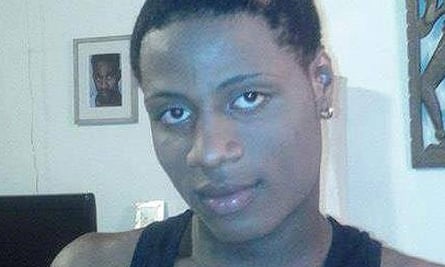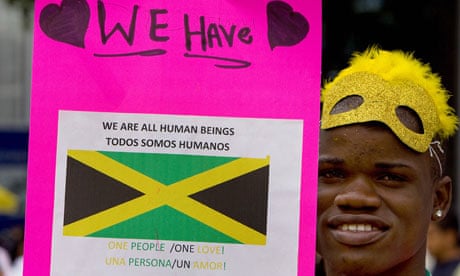Last month in Jamaica, a 16-year-old boy was beaten, stabbed, shot and run over by a car when he showed up at a party in women's clothing for the first time. Before his death, Dwayne Jones had endured relentless taunting, at home and at school, for being effeminate. His father kicked him out of the house aged 14, and subsequently helped neighbours drive him out of the slum where he was raised.
The discrimination and violence Dwayne experienced is the norm in my country. Last year, Maurice Tomlinson fled his homeland after he was sent death threats after local media reports about his marriage to a man in Canada. These are only the cases that make the news. Small wonder that Jamaica once had the dishonour of being named the most homophobic place on Earth by Time magazine.
This is not the Jamaica I know. This is not the Jamaica in which I want to live. Nor is this the reality I will accept for my brothers and sisters throughout the country.
Earlier this month in Montevideo, the Uruguayan capital, governments attending the first meeting of the regional conference on population and development in Latin America and the Caribbean approved a path for achieving – and going beyond – the Cairo programme of action. The latter, agreed at the 1994 international conference on population and development, included steps to ensure sexual and reproductive health and rights.
What do sexual and reproductive rights have to do with development? Everything. No sector of society is at greater risk of having these rights violated than socially marginalised and economically disenfranchised men, women and young people. Dwayne is one example among many. These abuses of individual human rights not only jeopardise the wellbeing of individuals affected, but also the world's prospects for achieving sustainable development.
Recently, a nine year-old girl was raped and impregnated by her grandfather. Because of Jamaica's strict abortion laws, she was forced to carry the child.
This is damaging not only to the girl, but also to her family. Many single-parent families, barely scraping by, cannot afford to house and feed another child. Yet a young woman from a poor household is more likely to face an unwanted pregnancy than her middle-class peers.

There is a perception locally that Jamaica is making progress on these issues. But it seems every time we take two steps forward, we take two back. A few years ago, a policy allowing adolescents to access contraception was affirmed but not implemented. To compound matters, subsequent legislation actively contradicted the proposal. Today, under 16s must have parental consent to access contraception – otherwise, health service providers inform the police, who then inform parents.
At the conference, I asked my government to take steps to change this by keeping the promise Jamaica made in 1994 to put the real-life needs of people at the centre of development efforts. This would include enacting and implementing laws and policies that protect the right of all to live free of prejudice, stigma, violence and sexual coercion. For young people, meanwhile, confidential access to health services and comprehensive sex education is essential, since it would help them stand up to entrenched discrimination against women and sexual minorities, in their own lives and their communities.
I also asked my government to go beyond the agreement made in Cairo. The world is much changed since 1994. The conference represents a key opportunity for Caribbean leaders to go beyond the programme of action and address issues such as HIV/Aids, sexual diversity, and the health and rights of the largest youth generation in history. With world leaders set to determine the next global development framework in the coming years, a regional agreement would feed into that process and, hopefully, place human rights at its core. If this does not happen, sustainable development will be impossible.
We have the opportunity to create a different kind of Jamaica and a different world, one where young people are able to exercise their sexuality in an autonomous and pleasurable way. Most importantly, we can create a world free of discrimination, inequality and violence, a world where people want to live. Isn't that the ultimate goal of development?
St Rachel Ustanny is chief executive officer of the Jamaica Family Planning Association




Comments (…)
Sign in or create your Guardian account to join the discussion